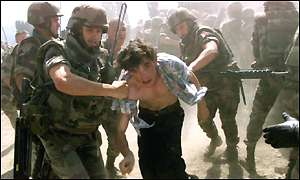
 The BBC's Ben Brown The BBC's Ben Brown"NATO must surely have hoped to create a better Kosovo than this"  real 28k real 28k |

One year after the beginning of Nato's 78-day aerial bombing campaign against Yugoslavia, Serbian Kosovo is dead. But Kosova, the Albanian name for the province which is still technically part of Serbia, is alive - if not well.
The record of the Nato-led peacekeeping force K-For and the UN administration in the province, Unmik, has been mixed, but the task they were set was immense - and ultimately perhaps impossible.
During the bombing campaign, which began on 24 March and lasted until K-For troops entered the province on 12 June 1999, the UN's refugee agency, the UNHCR registered 848,000 ethnic Albanians who had fled or been ethnically cleansed from the province.
Tens of thousands more were also sent fleeing into the hills and woods of the interior.

About 850,000 Kosovo Albanians fled during the war
|
By the end of February 2000 the number of refugees officially repatriated was 825,000 and tens of thousands more are likely to have returned without registering.
This extraordinarily rapid refugee return must rank as a major success for K-For and Unmik - but it is set against a UN estimate of 230,000 Serbs, Roma (Gypsies) and others who have been ethnically cleansed or fled since the ending of Serbian rule.
Revenge
In the wake of the collapse of Serbian administration and the repressive law and order that went with it, Unmik has found it hard to fill the vacuum.
Revenge attacks, ethnically motivated murders, bombings and arson have driven the vast majority of the remaining Kosovo Serbs and other non-Albanians in Kosovo into enclaves guarded by K-For troops.

There is a major shortage of police
|
A recent figure given by the Yugoslav authorities, which are not present on the ground, claims that there have been 793 murders of which 630 were Serbs or Montenegrins.
The UN has a figure of 488 of which 161 were Serbs and 197 Albanians and the rest unknown or others.
Police
Of some 4,700 international police designated for the province just a little over half have now started work and general crime, as opposed to ethnically motivated crime, is out of control.
While Serbs in central and southern Kosovo live in enclaves half the remaining estimated Serbs, 50,000 out of perhaps 100,000, live in northern Mitrovica, formerly a mixed town, and traditionally Serbian majority land in the north of Kosovo.

As K-For moved in Kosovo's Serbs moved out
|
Albanians from the now Serb-controlled north of Mitrovica want to return home but the Serbs say that north Mitrovica is one of the only places they are safe in Kosovo today and that they will be driven out if Albanians become the majority there again.
They also link the return of Albanians to the north to the return of Serbs to the south.
Partition
In effect a de facto partition of Kosovo has taken place and, if one day in the future Kosovo becomes independent, then Serbs in the north say they will secede from the province to remain in Serbia.
The problem of Mitrovica is vastly complicated by the fact that the area is home to a vast mining complex.

K-For has had to assume a policing role
|
Still, both Serbs and Albanians believe that immense riches remain to be exploited.
While K-For and Unmik can expect renewed clashes over Mitrovica in their second year, they are also bracing for conflict along Kosovo's eastern border.
Guerrilla group
On the Serbian side of the boundary lie three ethnic Albanian dominated areas, Bujanovac, Presevo and Medvedja.
A new ethnic Albanian guerrilla organisation has sprung up here, which demands that the area be joined to Kosovo.
They are supplied with arms and ammunition from Kosovo and have close links to the former guerrillas of the old Kosovo Liberation Army (KLA).
The area is home to some 70,000 ethnic Albanians but 6,000 have fled into Kosovo since June.

The KLA disbanded in September
|
The former KLA has now divided into several streams. The military leadership has transferred to a supposedly demilitarised civil emergency organisation called the Kosovo Protection Force.
Kosovo Albanians regard this as the nucleus of the future army of a future independent Kosovo.
There have been numerous allegations that its members have been involved in clashes on Kosovo's eastern border, in the ethnic cleansing of Serbs and crime.
KLA
In all major towns and cities of Kosovo, apart from northern Mitrovica, almost all trace of Serbia has been erased.
Immediately after the entry of K-For troops into Kosovo and with the collapse of the Serbian administration KLA men or KLA sponsored politicians moved to seize power in the town halls. A KLA dominated provisional government also began work.

Bernard Kouchner: Preparing for elections
|
So far Kosovo Serb representatives have refused to join this new administration.
Local elections are likely to be held in Kosovo this autumn. However there are no imminent plans for any general elections to any parliament which might determine the province's future.
Autonomy
The UN's Security Council Resolution 1244 which established Unmik asked it, "pending a final settlement", to prepare Kosovo for "substantial autonomy and self-government".
Resolution 1244 also reaffirmed the "sovereignty and territorial integrity of the Federal Republic of Yugoslavia", of which Kosovo remains a legal part.

K-For: In danger of being seen as occupiers
|
In the long run, frustration over this contradiction could lead Kosovo Albanians into conflict with Unmik and K-For, if they become seen as occupiers.
In the meantime Kosovo's future is also held to ransom by the extreme instability of the region.
Montenegro teeters on the brink of war, and many now believe that the regime of Slobodan Milosevic, the Yugoslav president, will only be changed through violence and bloodshed.
Tim Judah is the author of Kosovo: War and Revenge published by Yale University Press.
| Search BBC News Online |
||
Advanced search options |
||
The BBC is not responsible for the content of external internet sites
